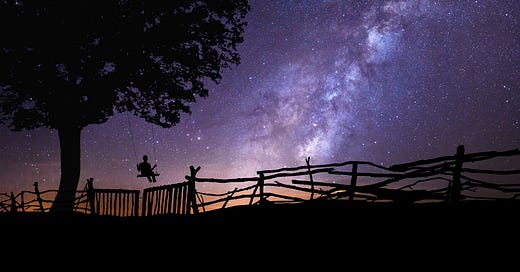Most atheists today embrace some form of philosophical naturalism. This is the view that the only concrete entities that exist are the physical universe in which we live, and the things that exist within it. Atheists often argue that theists, in positing another layer of reality, greatly complicate matters, and thus, given Occam’s Razor, theism is less likely to be true than atheistic naturalism.
However, though simplicity is a virtue in theories, it is a major criterion only when there is ceteris paribus (comparative equality) between theories. I have argued at length in my book Atheism? A Critical Analysis[1] that, in the debate between theism and atheism, other factors are not equal. Here I will very briefly outline an argument that I give.
The questions are: why does anything exist, and why do things remain in existence? Perfect Being theism (henceforth “theism”) posits a God who necessarily exists, and who has the power to create. The coming into existence and the remaining in existence of the contingent universe is dependent upon this necessarily existing God. Philosophical naturalism must give different explanations.
Many and varied explanations have been debated throughout the centuries, even millennia, as to why this possible world in which we live is instantiated. Some argue that the “natural” state of things is that nothing exists, and that, therefore, the existence of the universe requires an explanation. The other view is to think that there is an infinite number of possible universes (this including the world with no concrete objects in it), and one of them had to be actualized. Ours is just the lucky world that came up.[2]
It is sometimes said that there is either one possible world, or there are infinite possible worlds. Either this world, and everything in it, had to be with absolute necessity, or else any one of an infinity of worlds had to be. (Given theism, I do not think that this is true, but I am examining atheism now).
The first requires that there is a reason that the universe exists, rather than nothing's existing. By definition, contingent beings do not have the reason for their existence within themselves. There must be a necessarily existing being as a reason for why the universe exists. This being can be either the universe itself, or some necessary being external to the universe. The second option above takes a major step in the direction of theism, so atheists who want to remain atheists will avoid this.
The first option, that the universe is itself a necessary being, also has very serious problems. It requires that the universe and everything in it exist in the manner that they do necessarily. This necessity must be a very strong sort, a broadly logical or absolute necessity. This requires that every object, every property, every event, had to happen, on pain of logical contradiction if it did not. This seems wildly implausible at best.
The other theory, that one world had to be instantiated, and ours was, just by chance, fares no better. With theism, God, being omniscient, knows all possible worlds in detail, and for reasons best known to God, he chose to create this one. In naturalism, there is no being to choose to actualize, and hence whatever world exists, it exists by chance. There are huge problems with this option. This may be looked at from two different angles. First, from the world as a whole. Given this option, the laws of nature are contingent. If the actual world is actualized by chance, then the number of chaotic universes vastly outnumbers the consistently law-abiding ones. Further, worlds where the laws of physics change at times also greatly outnumber the consistently law-abiding ones. Therefore, that our universe should exist with laws of nature consistent over the whole universe throughout space and time, is astronomically improbable.
The same conclusion follows from taking single objects in the universe. Pick one individual proton called Bob. Bob can exist either 1) for no reason, 2) for a reason intrinsic to itself, or 3) for a reason extrinsic to itself. Option 2) cannot be correct, for then Bob would be a necessary being, which contradicts the scenario here. Neither can 3) be correct, for this can be applied to any contingent being, so it entails the existence of a necessary being, which is again a move in the direction of theism.
This leaves option 1 for the naturalist. This means that Bob (and everything else) exists by chance, for no reason. A problem with this is that it is arguable that things cannot just exist for no reason; that they need something to cause them to exist. I will ignore this objection. I will assume for now that things can exist for no reason. However, this leads to another problem. It would mean that at every moment that Bob exists, its existence is purely a matter of chance. For every moment it exists, Bob exists for no reason. Or, to put things another way, at every moment Bob exists, its existence is being actualized for no reason. The Kalam Cosmological Argument has as one of its premises that things cannot come into existence uncaused. I am granting for the sake of argument of the atheist that this premise may be false. However, to have an orderly universe, everything in it would have to exist over long periods of time in an orderly fashion, for no reason. This is simply incredible.
Long ago, C. S. Peirce wrote, “The chance-world… would be one in which there were no laws, the characters of different things being entirely independent; so that, should a sample of any kind of objects ever show a prevalent character, it could only be by accident, and no general proposition could ever be established.”[3]
Chance and necessity are the only options for the atheist, and both fail.
Notes
[1] Stephen E. Parrish, Atheism? A Critical Analysis (Eugene, OR: Wipf and Stock, 2019).
[2] John Leslie and Robert Lawrence Kuhn, eds. The Mystery of Existence (Malden, MA: Wiley-Blackwell, 2013).
[3] C. S. Peirce, Philosophical Writings of Pierce, selected and edited with an introduction by Justus Buchler (New York: Dover Publications, 1955), 223.
— Dr. Stephen E. Parrish is Professor of Philosophy at Concordia University in Ann Arbor Michigan, where he has taught for 22 years. He received his Ph.D. from Wayne State University in Detroit. He is author of God and Necessity, The Knower and the Known, and most recently, Atheism? A Critical Analysis. At present he is working on a book on metaethics. He has three grown daughters, and lives with his wife and cat.
Image by Michele Caballero Siamitras Kassube from Pixabay
Recommended Resource
One of the defining characteristics of Christian theism is its understanding of the nature and attributes of God. As one studies the doctrine of God, a number of questions naturally arise: Does God change? Does God have emotions? Does everything occur as God wills? Is God entirely good and loving? How can God be one God and three persons?
Skeptics frequently charge that one or more of God’s attributes is incoherent, or that they contradict one another. Believers often wonder what it means, for example, that God is unchanging or all-loving, and how they should understand God in light of these qualities.
Given the importance of these questions for the Christian worldview, we highly recommend John C. Peckham’s recent book on this topic, Divine Attributes: Knowing the Covenantal God of Scripture. Drawing on Scripture, theology, and philosophy, Peckham explains each attribute in detail, engages with the most important scholarship related to it, and shows how each can be understood in a theologically faithful and philosophically robust manner.
See our recent excerpt from the book titled The God of the Philosophers?
“This volume on the divine attributes and ‘covenantal theism’ is a superb work of theology. It is thorough, nuanced, and balanced. As in his other works, Peckham is both winsome and bold: he winsomely engages important age-old and more recent theological conversations and controversies, and he boldly challenges certain theological positions while confidently articulating and defending the considerable merits of covenantal theism.”
— Paul Copan, Pledger Family Chair of Philosophy and Ethics, Palm Beach Atlantic University; author of Loving Wisdom: A Guide to Philosophy and Christian Faith
“Divine Attributes will be a game changer for debates about the nature of God. Strict classical theists and open theists must deal with the powerful biblical case that Peckham presents. If you are looking for a theology text that is faithful to the biblical witness and sensitive to the philosophical challenges that arise from thinking about the nature of God, then Divine Attributes is the book for you.”
— R. T. Mullins, Helsinki Collegium for Advanced Studies
Find Divine Attributes: Knowing the Covenantal God of Scripture at Baker, Amazon, and other major booksellers.
*This is a sponsored post.
News
C. S. Lewis Changed His Mind About This Scene in The Chronicles of Narnia
Christianity Is the Best Explanation for Reality
Lucas's Godelian argument against materialism
1776 and the Origin Story of the Post-Christian West
Why I Didn't “Just Bake the Cake”
Hobby Lobby Sues Oxford Professor for $7 Million
9 Things You Should Know About the Tulsa Race Massacre
Video: A Scholar Explains the Book of Leviticus (w/ Dr. Jay Sklar)
Video: 5 Arguments for God from Miracles, from Keener to McGrew
Video: Richard Swinburne - Fallacies in Arguing for God?
(*The views expressed in the articles and media linked to do not necessarily represent the views of the editors of The Worldview Bulletin.)
A Master Class in Christian Worldview
Learn from world-class Christian apologists, scholars, and philosophers, and support our work of making these resources available, all for only $2.50 per month. There’s no obligation and you can easily cancel at any time. Be equipped, informed, and encouraged!
“The Worldview Bulletin is a must-have resource for everyone who’s committed to spreading and defending the faith. It’s timely, always relevant, frequently eye-opening, and it never fails to encourage, inspire, and equip.”
— Lee Strobel, New York Times bestselling author of more than forty books and founding director of the Lee Strobel Center for Evangelism and Applied Apologetics
“Staffed by a very respected and biblically faithful group of Evangelical scholars, The Worldview Bulletin provides all of us with timely, relevant, and Christian-worldview analysis of, and response to, the tough issues of our day. I love these folks and thank God for their work in this effort.”
— JP Moreland, distinguished professor of philosophy, Talbot School of Theology, Biola University, author of Scientism and Secularism: Learning to Respond to a Dangerous Ideology (Crossway)
Book Deals and Resources
Look here for Faithlife’s free eBook of the Month.
Visit here to get the Logos Free Book of the Month. You can download the free version of Logos which will allow you to access the monthly free books. Logos 9 is a great investment, though, and has tons of tools that make Bible study easier and richer. New users can get 50% off of the Logos 9 Fundamentals package, which discounts it to $49.99.
See the Logos Monthly Sale for dozens of good deals, and go here for 50% off of resources from Eerdmans.
Nearly all audiobooks at Christian Audio are on sale for $7.49 through June 30th.
Audiobook: The Christian in the World by C. S. Lewis, $2.99 (19 of Lewis’s essays on various subjects)
Crossway Weekly E-Book Deals: Biography
Biblical Theology According to the Apostles: How the Earliest Christians Told the Story of Israel by Chris Bruno, Jared Compton, and Kevin McFadden, $6.99
Union with Christ: The Way to Know and Enjoy God by Rankin Wilbourne, $2.99
The Missing Gospels: Unearthing the Truth Behind Alternative Christianities by Darrel Bock, $4.99
Theological Theodicy by Daniel Castelo, $2.99
Dream with Me: Race, Love, and the Struggle We Must Win by John Perkins, $1.99







Thank you for the excellent post Dr. Parrish. Though we are Atheists, we greatly admire your work. You're in fact one of the few Christian Apologists to actually take on formidable defenders of Atheism such as Graham Oppy, J.L. Mackie, Erik Wielenberg, etc. We hope that more Christian Apologists can follow your example and seek to engage with the best of Atheism (and of course we hope that Atheists can engage with the best of Theism as well, your work serving as a model).
While the issues in your post can definitely be extended and discussed in a more in-depth manner, we just want to highlight one avenue for the Naturalist and Atheist to take when it comes to questions of existence (namely the challenge offered by Leibnizian Cosmological Arguments from Contingency).
I think the first objection that can be put forward here is that from Hume. We can simply ask why think that an explanation of a whole cannot simply consist of whatever explains each part? We can say that an explanation of the contingent whole simply consists of the conjunction of the explanations of each contingent entity. Then there would be no need for a non-contingent cause.
Another contemporary variation of this response is Quentin Smith's argument[1]. Through the utilization of Big Bang Cosmology we can argue every instantaneous state of the universe corresponding to a number in the interval 0 > x < or = 1 preceded and is caused by earlier instantaneous states. Basically, this means that there is no instantaneous state in the first half-open second or the first half-open one-billionth of a second, which is uncaused. Since the beginning of the universe’s existence is the instantaneous states that are members of a half-open interval, it follows from Smith's argument[2] that the universe’s beginning to exist is internally caused. If Smith is correct then he has defeated the argument from contingency, to quote Smith:
"My explanation mentions only beings that exist contingently; the universe might not have existed and the states of the universe might not have existed. Since the existence of each state is caused by earlier states, and since the existence of all these states entails the universe’s existence, there is an explanation for everything that contingently exists."
Of course. I do think Quentin Smith's work approach can be challenged, but I also think he provides a unique avenue for Atheists and Naturalists to respond to the argument you've outlined here.
Thank you again for the post and we look forward to your future projects on the subject.
Notes:
[1] http://www.stafforini.com/docs/Smith%20-%20The%20reason%20the%20universe%20exists%20is%20that%20it%20caused%20itself%20to%20exist.pdf
[2] http://commonsenseatheism.com/wp-content/uploads/2009/04/smith-kalam-cosmological-arguments.pdf
[3] ibid.